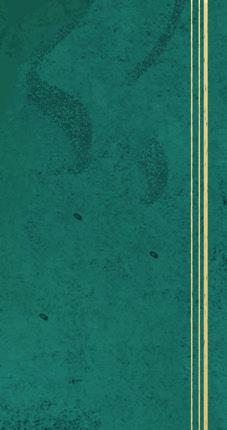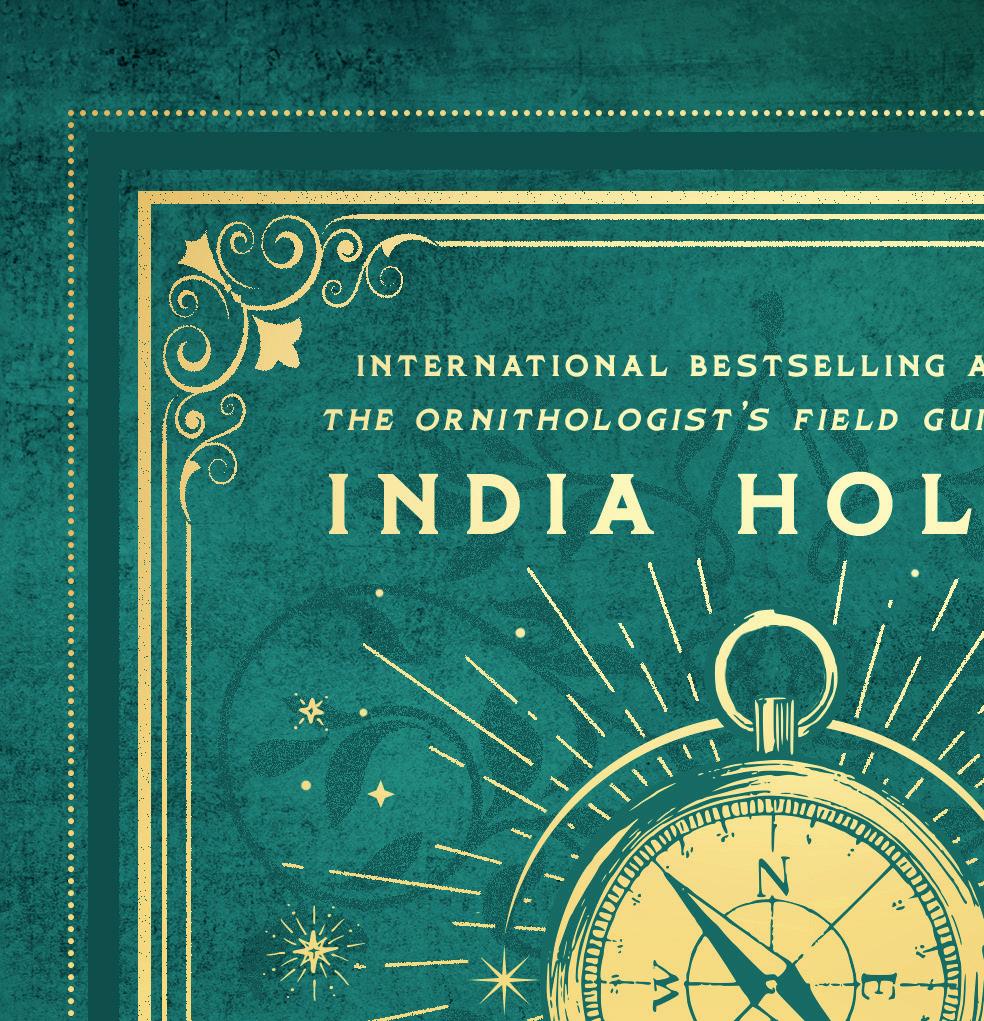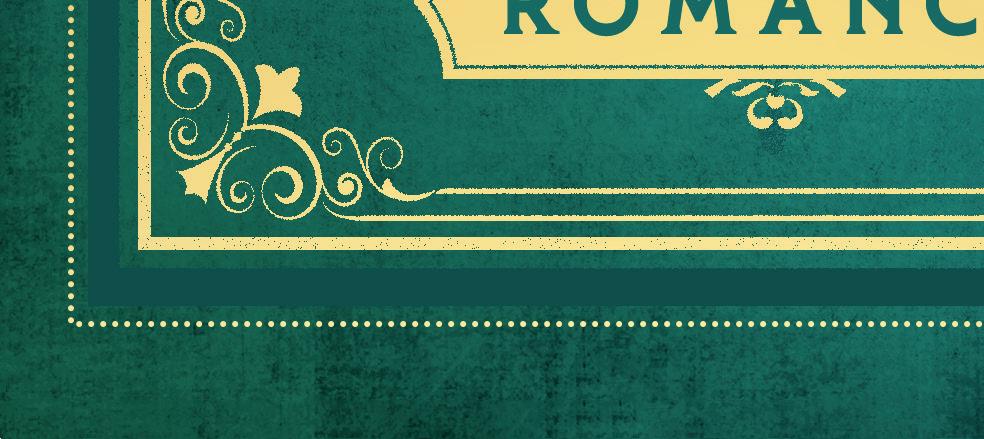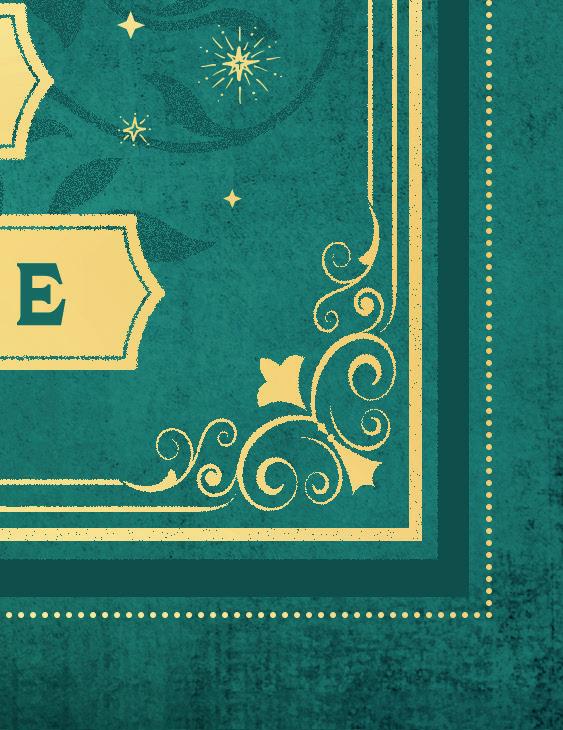PENGUIN BOOKS
UK | USA | Canada | Ireland | Australia India | New Zealand | South Africa
Penguin Books is part of the Penguin Random House group of companies whose addresses can be found at global.penguinrandomhouse.com
Penguin Random House UK , One Embassy Gardens, 8 Viaduct Gardens, London SW11 7BW penguin.co.uk
First published in the United States of America by Berkley, an imprint of Penguin Random House LLC 2025
First published in Great Britain by Penguin Books 2025 001
Copyright © India Holton, 2025
The moral right of the author has been asserted Penguin Random House values and supports copyright. Copyright fuels creativity, encourages diverse voices, promotes freedom of expression and supports a vibrant culture. Thank you for purchasing an authorized edition of this book and for respecting intellectual property laws by not reproducing, scanning or distributing any part of it by any means without permission. You are supporting authors and enabling Penguin Random House to continue to publish books for everyone. No part of this book may be used or reproduced in any manner for the purpose of training artificial intelligence technologies or systems. In accordance with Article 4(3) of the DSM Directive 2019/790, Penguin Random House expressly reserves this work from the text and data mining exception
Book design by Katy Riegel
Printed and bound in Great Britain by Clays Ltd, Elcograf S.p.A.
The authorized representative in the EEA is Penguin Random House Ireland, Morrison Chambers, 32 Nassau Street, Dublin D02 YH68
A CIP catalogue record for this book is available from the British Library
ISBN : 978–1–405–97259–8
Penguin Random House is committed to a sustainable future for our business, our readers and our planet. This book is made from Forest Stewardship Council® certified paper.
For the sky-dreaming, storm-hearted ones. Sometimes peace comes in stillness, sometimes it comes in a wild dance.
TABLE OF SIGNIFICANT CHARACTERS
In Order of Appearance
Elodie Hughes Tarrant . . . a specialist in chaos
Motthers . . . the eye of a metaphorical storm
Gabriel Tarrant . . . a professional curmudgeon
Beetleson . . . a fall guy
Amelia Tarrant . . . steady ground
Algernon Jennings . . . the human equivalent of a marshland
Mr. Bloyd . . . operator of a magnificent flying machine
Various tourists
Mr. Parry . . . sees which way the wind blows
Tegan Parry . . . as yet uncharted land
Baby . . . with a name like that, is it any wonder he’s angry?
Assorted locals
Pimmersby & Hapsitch . . . a poetic duo
Mumbers . . . airhead
Professor Jackson . . . a disaster expert
Random students
Diverse faculty members
Professor Slummery . . . the real nemesis
IRISH SEA
WALES
ENGLAND
Aberystwyth
Dôlylleuad
Oxford Hereford
Cheltenham
ENGLISH CHANNEL London
IRELAND
CELTIC SEA
5-SEQ F EY L INE
T he
G eo G rapher ’ s M ap
T o ro M ance
c hap T er o ne
Speak softly and carry a big telescope.
Blazing Trails, W.H. Jackson
Oxford, 1890
Ageographer behaves with quiet dignity at all times. Elodie Tarrant had been informed of this maxim by many professors over the years, and she took great pains to impress it upon her own students. England’s surveyors and mapmakers must be known for their decorum so they are not known for their trespassing and shot at. Consequently, Elodie had chosen to cycle to the Oxford train station that morning, rather than run along the streets— walking in a dignified manner being out of the question, considering how late she was.
And this would have been entirely commendable, except for the small but not untrivial matter of her bicycle being a steampowered velocipede.
Anyone not immediately witness to the spectacle of a helmet-clad woman perched upon a rickety wheeled contraption, with steam clouds billowing around her and a long, unbuttoned tweed coat billowing behind, was alerted to it by the loud rattling, tooting, and random belches of the machine. At
“Um.”
least her skirt did not billow—but as this was because she had it knotted up around her knees, thus revealing her stockingclad legs, it rather failed to argue in favor of dignity.
“Faster!” she urged the vehicle, as though doing so might make some difference to its speed. “It will be a disaster if I miss that train!”
“Never mind. I’ll ask someone from the classics department when I get back.” She hung the helmet on the velocipede’s handlebars and began to gather up her hair, looking around as if clips might appear midair for her convenience. Then she noticed Motthers’s dazed stare. “What?”
“T-ticket, ma’am,” he said, holding it out in a trembling hand. Elodie took it from him, her hair tumbling down again.
“Much obliged.”
But Motthers was not done with trembling. “There’s, um, a small problem.”
She spoke literally. News had arrived yesterday that, following a large storm, magic was afoot in Wales, igniting trees and sending sheep airborne. The Home Office had called upon Professor Tarrant to manage the crisis. Being one of England’s foremost specialists in exigent thaumaturgic geographic dynamics (otherwise known as “magical mayhem” to people who valued their vocal cords), Elodie received many such requests, and usually delegated them to graduate students. But with the Michaelmas term still a week away, Elodie rather fancied a few days in the autumnal countryside.
“Oh?” Elodie asked, not really listening as she inspected the ticket. It provisioned her with a second class seat from Oxford to Aberystwyth, after which she and Motthers would take a hired carriage to Dôlylleuad. This was altogether a journey of several long, dull hours, but Elodie didn’t mind, feeling that tedium was best described as an opportunity for imagination.
“Just a very small problem,” Motthers persisted. “Which is to say, quite large actually, and— and— problematic.”
“Uh-huh.” Elodie experienced so many problems in her profession that they had to be literal disasters before she started worrying. Motthers, however, was only a master’s degree student, and had not yet been caught in a raging flood, let alone outrun fiery boulders that chased him uphill. He needed several more catastrophes under his belt before he developed perspective. As a result, his voice tried to hide behind his tonsils when next he spoke.
Besides, there existed a small chance that this job would indeed require her advanced expertise. The site—Dôlylleuad, a minor village ten miles east of the Welsh coastline— contained a deposit of subterranean thaumaturgical minerals marked as a level five trove on the Geographic Paranormal Survey map, which recorded all known sources of earth magic, along with the fey lines that connected them in a complex web around the world. Level five indicated minerals powerful enough to send dangerous sorcerous energy down the line to Oxford and its various libraries just waiting to explode, then on to London, where an incursion of wild magic would have cataclysmic results.
“You recall how the telegram yesterday requested aid from Professor Tarrant?”
Immediately, Elodie had packed a suitcase, postponed her milk delivery, and organized to catch the earliest morning train to Wales. It was the perfect rapid response.
“Sure,” Elodie said, barely listening. Suitcase in hand, she began striding through the station building toward the plat-
At least, up until the part where she forgot to set her alarm clock.
Arriving at Oxford Station with less than ten minutes to spare, she parked the velocipede and was untying the suitcase from its luggage tray when a young man approached, mustache trembling on his thin brown face as he hugged a clipboard of papers.
“Professor Tarrant?” he peeped.
“Um,” Motthers said, scurrying to keep pace despite his legs being several inches longer than Elodie’s (which prompted him to wonder if he should mention the knotted-up skirt, but his courage failed). “It’s just, well, it seems a copy was made of the telegram, and someone who shall go unnamed [Ralph Salterling] delivered it to a second office.”
“Oh?” Elodie stopped near the edge of the platform and shielded her eyes with her free hand from the limpid morning sun as she peered along the tracks for a glimpse of a train. Incredibly, she had managed to arrive early.
“Ah, there you are, Motthers.” Elodie turned to him with a brisk nod. He took in her entirely rational ensemble of coat, white shirtwaist, and gray skirt, and then her altogether irrational stockings exposed to general view (one black French lace, the other green, embroidered with flowers), and he winced so deeply his neck disappeared. “Is everything prepared?” she asked.
“Yes, ma’am. I have the emergency response kit, two tickets for the train, and a plentiful supply of sandwiches.”
Elodie waited . . .
“Ham with cheese,” he clarified.
“To be fair,” Motthers continued, “we’re not exactly sure who the message was meant for in the first place, you or . . . the other Professor Tarrant.”
Elodie continued gazing out beneath her hand at the horizon, mainly because she had frozen. Then, very slowly, she turned to look at the small crowd on the platform.
And there he was.
She grinned. “Well done.” Removing the helmet, she shook out her long, pale blonde hair. It tumbled down in reckless waves—magical hair, literally, having been mousy brown until, at age thirteen, she swam in a moonlit lake she had absolutely no idea was enchanted. “Sorry I’m late,” she said, sweeping wayward strands from her face. “I overslept, then I started wondering during breakfast about how Persephone went for nine days in the underworld before eating the pomegranate seeds, and I quite lost track of time. Do you know?”
“Know what, Professor?” Motthers asked warily.
“You ,” she muttered with such ferocity, it must be cause for amazement that the gentleman did not spontaneously combust. He did not even so much as flinch, however. Indeed, he might have been a statue erected in honor of Elodie’s worst memory. All the familiar details were present: tidy black hair, almost-black eyes, olive skin, suit so immaculate he could have worn it to meet the pope, were he not an agnostic. Absent was any human warmth. Behind him, a graduate student fussed with their emergency response kit, but he ignored them, ignored the
“How she survived all that time without even drinking water, of course.” form, the heels of her sturdy half boots knocking against the ground as if to announce to other travelers that a professional heroine had arrived— although apparently this was not clear enough for Professor Palgrave, who was forced to leap aside, muttering about “sinful blindness.”
“Um.”
“Never mind. I’ll ask someone from the classics department when I get back.” She hung the helmet on the velocipede’s handlebars and began to gather up her hair, looking around as if clips might appear midair for her convenience. Then she noticed Motthers’s dazed stare. “What?”
“T-ticket, ma’am,” he said, holding it out in a trembling hand. Elodie took it from him, her hair tumbling down again.
“Much obliged.”
But Motthers was not done with trembling. “There’s, um, a small problem.”
“Oh?” Elodie asked, not really listening as she inspected the ticket. It provisioned her with a second class seat from Oxford to Aberystwyth, after which she and Motthers would take a hired carriage to Dôlylleuad. This was altogether a journey of several long, dull hours, but Elodie didn’t mind, feeling that tedium was best described as an opportunity for imagination.
“Just a very small problem,” Motthers persisted. “Which is to say, quite large actually, and— and— problematic.”
“Uh-huh.” Elodie experienced so many problems in her profession that they had to be literal disasters before she started worrying. Motthers, however, was only a master’s degree student, and had not yet been caught in a raging flood, let alone outrun fiery boulders that chased him uphill. He needed several more catastrophes under his belt before he developed perspective. As a result, his voice tried to hide behind his tonsils when next he spoke.
“You recall how the telegram yesterday requested aid from Professor Tarrant?”
“Sure,” Elodie said, barely listening. Suitcase in hand, she began striding through the station building toward the plat-
form, the heels of her sturdy half boots knocking against the ground as if to announce to other travelers that a professional heroine had arrived— although apparently this was not clear enough for Professor Palgrave, who was forced to leap aside, muttering about “sinful blindness.”
“Um,” Motthers said, scurrying to keep pace despite his legs being several inches longer than Elodie’s (which prompted him to wonder if he should mention the knotted-up skirt, but his courage failed). “It’s just, well, it seems a copy was made of the telegram, and someone who shall go unnamed [Ralph Salterling] delivered it to a second office.”
“Oh?” Elodie stopped near the edge of the platform and shielded her eyes with her free hand from the limpid morning sun as she peered along the tracks for a glimpse of a train. Incredibly, she had managed to arrive early.
“To be fair,” Motthers continued, “we’re not exactly sure who the message was meant for in the first place, you or . . . the other Professor Tarrant.”
Elodie continued gazing out beneath her hand at the horizon, mainly because she had frozen. Then, very slowly, she turned to look at the small crowd on the platform.
And there he was.
“You ,” she muttered with such ferocity, it must be cause for amazement that the gentleman did not spontaneously combust. He did not even so much as flinch, however. Indeed, he might have been a statue erected in honor of Elodie’s worst memory. All the familiar details were present: tidy black hair, almost-black eyes, olive skin, suit so immaculate he could have worn it to meet the pope, were he not an agnostic. Absent was any human warmth. Behind him, a graduate student fussed with their emergency response kit, but he ignored them, ignored the
“Um.”
entire world, staring instead at a small, oblong wooden block in his hand with an expression so stern it made a rock seem like quivering jelly.
Yet Elodie knew that he’d seen her, without a doubt. He saw everything.
Gabriel.
“Never mind. I’ll ask someone from the classics department when I get back.” She hung the helmet on the velocipede’s handlebars and began to gather up her hair, looking around as if clips might appear midair for her convenience. Then she noticed Motthers’s dazed stare. “What?”
Professor Tyrant to his students (and several members of the faculty when they thought no one could hear them).
“T-ticket, ma’am,” he said, holding it out in a trembling hand. Elodie took it from him, her hair tumbling down again.
Her husband.
“Much obliged.”
But Motthers was not done with trembling. “There’s, um, a small problem.”
Elodie’s face blazed. She thrust the suitcase at Motthers without looking, turned on a heel, and began striding back toward the velocipede.
“P-Professor!” Motthers cried out, but Elodie ignored him. She had to get away . . . even while her mind ran headlong into the pit of memory.
“Oh?” Elodie asked, not really listening as she inspected the ticket. It provisioned her with a second class seat from Oxford to Aberystwyth, after which she and Motthers would take a hired carriage to Dôlylleuad. This was altogether a journey of several long, dull hours, but Elodie didn’t mind, feeling that tedium was best described as an opportunity for imagination.
She’d married Gabriel on a Monday afternoon in September, almost exactly one year ago. It had been an accident.
“Just a very small problem,” Motthers persisted. “Which is to say, quite large actually, and— and— problematic.”
If only she’d not gone to the Minervaeum, London’s private club for academics, after attending the annual Thaumaturgic Cartography Symposium. If only she’d not felt so queasy from the odors of pipe smoke, steamed pudding, and nitroglycerine swirling through the club’s Paracelsus Lounge that she’d decided to open a window. And if only doing so had not brought her close enough to where Gabriel sat with Professor Dubrovic that she’d overheard their conversation.
“Uh-huh.” Elodie experienced so many problems in her profession that they had to be literal disasters before she started worrying. Motthers, however, was only a master’s degree student, and had not yet been caught in a raging flood, let alone outrun fiery boulders that chased him uphill. He needed several more catastrophes under his belt before he developed perspective. As a result, his voice tried to hide behind his tonsils when next he spoke.
“You recall how the telegram yesterday requested aid from Professor Tarrant?”
“Oh dear,” Professor Dubrovic was saying. “Four Balliol students living upstairs from your flat?” He shook his head sympathetically.
“Sure,” Elodie said, barely listening. Suitcase in hand, she began striding through the station building toward the plat-
“They are constantly quoting poetry,” Gabriel answered, 4
form, the heels of her sturdy half boots knocking against the ground as if to announce to other travelers that a professional heroine had arrived— although apparently this was not clear enough for Professor Palgrave, who was forced to leap aside, muttering about “sinful blindness.”
managing to grouch in such refined tones that one naturally assumed he was in the right because he sounded like he must be. “And they debate Shakespeare’s authorship at the top of their lungs. Or perhaps it’s just that they want breakfast at all hours—in any case, if I hear another cry for Bacon, I will go quite mad. I need to find new accommodation before I’m driven to educate them.”
“The place across from me on Holywell Street is vacant,” Dubrovic said.
“I know, and it would be ideal. I inquired, but the landlady only wants a married couple.”
“Um,” Motthers said, scurrying to keep pace despite his legs being several inches longer than Elodie’s (which prompted him to wonder if he should mention the knotted-up skirt, but his courage failed). “It’s just, well, it seems a copy was made of the telegram, and someone who shall go unnamed [Ralph Salterling] delivered it to a second office.”
Dubrovic shrugged. “So get married.”
“Oh?” Elodie stopped near the edge of the platform and shielded her eyes with her free hand from the limpid morning sun as she peered along the tracks for a glimpse of a train. Incredibly, she had managed to arrive early.
“To be fair,” Motthers continued, “we’re not exactly sure who the message was meant for in the first place, you or . . . the other Professor Tarrant.”
There followed a pause in the conversation, due to a chemistry professor across the room having detonated her pudding. While the other patrons variously cheered or complained, Dubrovic smirked over the rim of his whiskey glass at Gabriel. “No need to look so perturbed, old chap. Amor est mortuus. I’m talking about a marriage of convenience.”
Gabriel frowned. “Oh? And where would I find a wife at such short notice?”
Elodie continued gazing out beneath her hand at the horizon, mainly because she had frozen. Then, very slowly, she turned to look at the small crowd on the platform.
And there he was.
“You ,” she muttered with such ferocity, it must be cause for amazement that the gentleman did not spontaneously combust. He did not even so much as flinch, however. Indeed, he might have been a statue erected in honor of Elodie’s worst memory. All the familiar details were present: tidy black hair, almost-black eyes, olive skin, suit so immaculate he could have worn it to meet the pope, were he not an agnostic. Absent was any human warmth. Behind him, a graduate student fussed with their emergency response kit, but he ignored them, ignored the
I’d marry you, Elodie thought with a wistful sigh. She’d adored him since the day they had met in Advanced Principles of Thaumaturgical Cartography, two eighteen-year-olds embarking upon a master’s degree far sooner than their peers. He’d gotten there via a bachelor’s degree (First Class Honors with Distinction), whereas her route had been through exceptional entry, having spent most of her life in the fields of Europe and Canada with her geographer parents. It was a difference in education that reflected their contrasting personalities, and yet Gabriel had from the very start represented Elodie’s ideal of manhood, since even as a young man he’d
“Um.”
possessed compelling gravitas and exceptional intelligence (along with perfectly aligned facial contours).
“Never mind. I’ll ask someone from the classics department when I get back.” She hung the helmet on the velocipede’s handlebars and began to gather up her hair, looking around as if clips might appear midair for her convenience. Then she noticed Motthers’s dazed stare. “What?”
“T-ticket, ma’am,” he said, holding it out in a trembling hand. Elodie took it from him, her hair tumbling down again.
But he also scrupulously ignored her existence. Elodie could not blame him, however. She was neither beautiful nor thin, she lacked proper refinement, and then there was that time she accidentally dented his expensive, thaumaturgically charged copper sieve when using it to swat a fly in the classroom . . .
“Much obliged.”
But Motthers was not done with trembling. “There’s, um, a small problem.”
Suddenly, a ringing silence made her look up from the window’s latch, whereupon she discovered that Gabriel had become very aware indeed of her existence and was staring at her in a way that made her feel like a map of some newly discovered shore.
For one frantic second, Elodie mentally cataloged every wrinkle and ink stain on her dress. Then she dragged together whatever dignity she could find within herself and stared right back at him. “What?” she said defensively.
“Oh?” Elodie asked, not really listening as she inspected the ticket. It provisioned her with a second class seat from Oxford to Aberystwyth, after which she and Motthers would take a hired carriage to Dôlylleuad. This was altogether a journey of several long, dull hours, but Elodie didn’t mind, feeling that tedium was best described as an opportunity for imagination.
“You’d marry me?” he asked, echoing the thought she’d apparently spoken aloud.
“Just a very small problem,” Motthers persisted. “Which is to say, quite large actually, and— and— problematic.”
Oh, damn.
“Uh-huh.” Elodie experienced so many problems in her profession that they had to be literal disasters before she started worrying. Motthers, however, was only a master’s degree student, and had not yet been caught in a raging flood, let alone outrun fiery boulders that chased him uphill. He needed several more catastrophes under his belt before he developed perspective. As a result, his voice tried to hide behind his tonsils when next he spoke.
“You recall how the telegram yesterday requested aid from Professor Tarrant?”
“Sure,” Elodie said, barely listening. Suitcase in hand, she began striding through the station building toward the plat-
“The other professors don’t respect me,” she explained two days later, back in Oxford, as they walked to a church, the landlady having accepted Gabriel’s application. Elodie’s hair was unraveling from the intricate arrangement she’d spent hours concocting, her white dress was really far too matrimonial for the occasion, and somewhere along the way she’d lost her quiet dignity, perhaps in the same place as the handkerchief she’d bought for the traditional “something blue.” Every few yards she glanced at her husband-to-be, still not quite be-
form, the heels of her sturdy half boots knocking against the ground as if to announce to other travelers that a professional heroine had arrived— although apparently this was not clear enough for Professor Palgrave, who was forced to leap aside, muttering about “sinful blindness.”
lieving the situation she found herself in. He just stared ahead, giving the impression he was walking alone. Nevertheless, Elodie couldn’t stop talking.
“They think an unwed female professor is a terrible idea. That’s why I’m agreeing to marry you.” (Well, and the fact that she was an idiot, unable to keep her thoughts in her own head.)
“Um,” Motthers said, scurrying to keep pace despite his legs being several inches longer than Elodie’s (which prompted him to wonder if he should mention the knotted-up skirt, his courage failed). “It’s just, well, it seems a copy was made of the telegram, and someone who shall go unnamed [Ralph Salterling] delivered it to a second office.”
“Uh-huh,” Gabriel answered, glowering at a nearby oak that was casting its old russet leaves like wishes onto the footpath.
Actually, now that she mentioned it, Elodie felt quite heated on the subject. “Women have been allowed tertiary education for a hundred years now, thanks to Queen Charlotte’s sponsoring it, and yet Oxford’s geography staff think a woman with a doctorate is something bizarre. Never mind that there’s a female ornithology professor even younger than I am; never mind that I know what I’m doing. I have more field experience than most of them put together, but do they care?”
“Oh?” Elodie stopped near the edge of the platform and shielded her eyes with her free hand from the limpid morning sun as she peered along the tracks for a glimpse of a train. Incredibly, she had managed to arrive early.
“To be fair,” Motthers continued, “we’re not exactly sure who the message was meant for in the first place, you or . . . the other Professor Tarrant.”
“How strange,” Gabriel said as he watched a squirrel scamper up the tree with a paperback novel in its mouth.
Elodie continued gazing out beneath her hand at the horizon, mainly because she had frozen. Then, very slowly, she turned to look at the small crowd on the platform.
And there he was.
“Yes, exactly! Strange is just how I would describe it. Strange, and yet so very common. Misogynistic. The departmental secretary told me outright that I’d plague other professors with my ‘tempting availability.’ ”
“Hm.”
“My mother said that was probably just his way of asking me on a date.”
“I know! Can you believe it?”
“Did you believe it?” he asked in return. 5
Gabriel almost tripped on the edge of a cobblestone. “What?” he said, looking at her finally, his forehead creased with a frown.
“You ,” she muttered with such ferocity, it must be cause for amazement that the gentleman did not spontaneously combust. He did not even so much as flinch, however. Indeed, he might have been a statue erected in honor of Elodie’s worst memory. All the familiar details were present: tidy black hair, almost-black eyes, olive skin, suit so immaculate he could have worn it to meet the pope, were he not an agnostic. Absent was any human warmth. Behind him, a graduate student fussed with their emergency response kit, but he ignored them, ignored the
“Um.”
She huffed a laugh. “No. The only dates Hammerson knows about are the ones he buys at the greengrocer’s in an effort to be cosmopolitan.”
“Never mind. I’ll ask someone from the classics department when I get back.” She hung the helmet on the velocipede’s handlebars and began to gather up her hair, looking around as if clips might appear midair for her convenience. Then she noticed Motthers’s dazed stare. “What?”
Gabriel glared at the church farther along the street as they continued toward it. He clearly did not want conversation, but if Elodie had ever found an off switch within herself, she’d lost it again long ago.
“T-ticket, ma’am,” he said, holding it out in a trembling hand. Elodie took it from him, her hair tumbling down again.
“When I’m married to you, they’ll have to respect me.” (For no other reason than the fear that, if they didn’t, Professor Tyrant might come and look at them.)
“Much obliged.”
But Motthers was not done with trembling. “There’s, um, a small problem.”
“So,” Gabriel said, “if we do this, I get decent housing, and you gain the respect of your peers? And you think that’s a good deal?”
“Oh?” Elodie asked, not really listening as she inspected the ticket. It provisioned her with a second class seat from Oxford to Aberystwyth, after which she and Motthers would take a hired carriage to Dôlylleuad. This was altogether a journey of several long, dull hours, but Elodie didn’t mind, feeling that tedium was best described as an opportunity for imagination.
Elodie recognized that he was offering her a chance to withdraw, and she considered it—which is to say, immediately, completely refused it. Her proposal may have been accidental, but the opportunity to marry Gabriel Tarrant was, as her more modish students would say, a no-brainer.
“Just a very small problem,” Motthers persisted. “Which is to say, quite large actually, and— and— problematic.”
In other words, she failed to apply her brain to it.
“Yes,” she answered.
Twenty minutes later, she was standing in a quiet, sunspangled chapel, trying hopelessly to repair her coiffure while Gabriel persuaded the vicar to marry them.
Ten minutes after that, they were pronounced man and wife. Gabriel lowered his head to kiss her.
“Uh-huh.” Elodie experienced so many problems in her profession that they had to be literal disasters before she started worrying. Motthers, however, was only a master’s degree student, and had not yet been caught in a raging flood, let alone outrun fiery boulders that chased him uphill. He needed several more catastrophes under his belt before he developed perspective. As a result, his voice tried to hide behind his tonsils when next he spoke.
“You recall how the telegram yesterday requested aid from Professor Tarrant?”
“Er, we don’t do that bit in the Church of England,” the vicar interjected—but he could have broken into a flamboyant aria and Elodie wouldn’t have noticed. Gabriel mustn’t have noticed either, for he went ahead and pressed his lips gently against hers.
Although he touched her nowhere else, Elodie felt em-
“Sure,” Elodie said, barely listening. Suitcase in hand, she began striding through the station building toward the plat-
braced by his entire being. Her heartbeat turned to stars, and her brain dissolved into a golden haze of pleasure from which she only grudgingly emerged some two days later, in Gabriel’s flat, in Gabriel’s bed, the marriage having been consummated to a degree that did not just meet but delightfully exceeded legal requirements. (They were, after all, two people who liked to be very thorough in what they did.) Any initial shy awkwardness had been vanquished by her joyous nature, his cool arrogance, and the excellent quality of the kissing.
form, the heels of her sturdy half boots knocking against the ground as if to announce to other travelers that a professional heroine had arrived— although apparently this was not clear enough for Professor Palgrave, who was forced to leap aside, muttering about “sinful blindness.”
“Um,” Motthers said, scurrying to keep pace despite his legs being several inches longer than Elodie’s (which prompted him to wonder if he should mention the knotted-up skirt, but his courage failed). “It’s just, well, it seems a copy was made of the telegram, and someone who shall go unnamed [Ralph Salterling] delivered it to a second office.”
“Oh?” Elodie stopped near the edge of the platform and shielded her eyes with her free hand from the limpid morning sun as she peered along the tracks for a glimpse of a train. Incredibly, she had managed to arrive early.
“To be fair,” Motthers continued, “we’re not exactly sure who the message was meant for in the first place, you or . . . the other Professor Tarrant.”
It seemed a positive start, even if there was a small debate over the correct placement of used towels in the bathroom (which, Elodie learned, was apparently not “in a heap on the floor”). On the third day, they walked across to the rental house on Holywell Street, their companionable quiet feeling like a magic spell held in place by the gold ring on Elodie’s finger, which Gabriel had unexpectedly produced. On the doorstep of ninety-nine, Gabriel introduced her to the landlady as his wife. That Elodie managed not to giggle would have made her parents astonished proud.
But the landlady barred the threshold to them. “I’ve already rented it,” she said.
Elodie continued gazing out beneath her hand at the horizon, mainly because she had frozen. Then, very slowly, she turned to look at the small crowd on the platform.
And there he was.
They stared at her in disbelief. “We had an agreement,” Gabriel said.
“Sorry. Dr. Costas made me a better offer.”
“Dr. Andro Costas?” Gabriel asked.
“You know him?”
“Tall. Blond. A bachelor.”
The woman winked at Elodie. “Yes, well, he’s going to supplement the rent with free massages for my nervous condition. He has a special vibratory device.” And she shut the door in their faces.
“You ,” she muttered with such ferocity, it must be cause for amazement that the gentleman did not spontaneously combust. He did not even so much as flinch, however. Indeed, he might have been a statue erected in honor of Elodie’s worst memory. All the familiar details were present: tidy black hair, almost-black eyes, olive skin, suit so immaculate he could have worn it to meet the pope, were he not an agnostic. Absent was any human warmth. Behind him, a graduate student fussed with their emergency response kit, but he ignored them, ignored the
“Um.”
They stood in a silence so comprehensive it could have built a whole new house. Elodie’s heartbeat began accelerating with an instinct for impending disaster. “Now what?” she asked.
“Never mind. I’ll ask someone from the classics department when I get back.” She hung the helmet on the velocipede’s handlebars and began to gather up her hair, looking around as if clips might appear midair for her convenience. Then she noticed Motthers’s dazed stare. “What?”
Gabriel looked at her warily. “What do you mean?”
“Well, we only married so you could get this house.”
Gabriel grew pale, but his eyes were darker than night as he stared at her. Belatedly realizing how she must have sounded, Elodie rushed to clarify. “I mean, I got what I wanted from our deal, but . . .”
“T-ticket, ma’am,” he said, holding it out in a trembling hand. Elodie took it from him, her hair tumbling down again.
“Much obliged.”
But Motthers was not done with trembling. “There’s, um, a small problem.”
No, stop! her brain shouted. But it was too late. Gabriel’s expression turned thunderous. Pivoting abruptly, he marched away. Elodie stared after him for a moment, then left in the opposite direction.
And that had been that for their marriage.
“Oh?” Elodie asked, not really listening as she inspected ticket. It provisioned her with a second class seat from Oxford to Aberystwyth, after which she and Motthers would take a hired carriage to Dôlylleuad. This was altogether a journey of several long, dull hours, but Elodie didn’t mind, feeling that tedium was best described as an opportunity for imagination.
“Just a very small problem,” Motthers persisted. “Which is to say, quite large actually, and— and— problematic.”
“Professor!” Motthers squeaked, trying to juggle suitcase, clipboard, backpack, and wits as he hurried after her across the platform. “The train!”
“Uh-huh.” Elodie experienced so many problems in profession that they had to be literal disasters before she started worrying. Motthers, however, was only a master’s degree student, and had not yet been caught in a raging flood, let alone outrun fiery boulders that chased him uphill. He needed several more catastrophes under his belt before he developed perspective. As a result, his voice tried to hide behind his tonsils when next he spoke.
“You recall how the telegram yesterday requested aid from Professor Tarrant?”
“I won’t be catching it,” Elodie said, walking faster. In the past year since that wedding, general opinion as to her respectability did the opposite of improve; indeed, scurrilous gossip spread beyond the geography department to most of Oxford and even as far as her parents in Shropshire, who declared themselves bemused (but, alas, not entirely surprised) that she would marry a colleague on a sudden whim then abandon both him and her reputation to continue living alone. And Gabriel’s search for accommodation had been completely derailed, since an estranged husband was considered even less reliable a tenant than a bachelor was. All in all, the marriage had turned out to
“Sure,” Elodie said, barely listening. Suitcase in hand, she began striding through the station building toward the plat-
be very inconvenient indeed. But having no grounds for an annulment, they were stuck with it.
5 form, the heels of her sturdy half boots knocking against the ground as if to announce to other travelers that a professional heroine had arrived— although apparently this was not clear enough for Professor Palgrave, who was forced to leap aside, muttering about “sinful blindness.”
“Um,” Motthers said, scurrying to keep pace despite his legs being several inches longer than Elodie’s (which prompted him to wonder if he should mention the knotted-up skirt, but his courage failed). “It’s just, well, it seems a copy was made of the telegram, and someone who shall go unnamed [Ralph Salterling] delivered it to a second office.”
Each blamed the other— or, at least, Elodie initially blamed herself, and wallowed in the depths of guilty despair, but since Gabriel made no effort to persuade her otherwise, she turned quite readily to blaming him. In short order, they moved from being lovers to enemies. No conversation passed between them other than a few curt greetings when absolutely required, and one particularly fiery verbal skirmish over whether to stock chocolate jumbles or plain digestive biscuits in the faculty tea cupboard.
“Oh?” Elodie stopped near the edge of the platform and shielded her eyes with her free hand from the limpid morning sun as she peered along the tracks for a glimpse of a train. credibly, she had managed to arrive early.
“To be fair,” Motthers continued, “we’re not exactly sure who the message was meant for in the first place, you or . . . the other Professor Tarrant.”
Furthermore, Elodie learned to be a veritable escape artist, disappearing through doorways, behind hedges, and down stairwells whenever she saw Gabriel; once she even jumped out a first-floor window—the consequences of which to her ankle were luckily healed now, thus enabling her to move at speed across the train platform. Certainly, a master’s student with a flimsy mustache could not stop her.
“But the magic!” Motthers cried.
“Professor Tarrant— the other one— will attend to that. You can join his team.”
Elodie continued gazing out beneath her hand at the horizon, mainly because she had frozen. Then, very slowly, she turned to look at the small crowd on the platform.
And there he was.
“But soil contamination from aeolian transportation of explosively thaumaturgized Neoproterozoic-Cambrian rock particles!”
Elodie’s heart sank. Damn. Motthers was right. Dôlylleuad was sure to be in a bad way. She imagined the starved faces of children deprived of vital sustenance from . . . She paused to search her memory for the area’s main produce . . . Er, pears.
“Fine,” she muttered, coming to a halt.
“Pardon?” Motthers asked daringly.
“You ,” she muttered with such ferocity, it must be cause for amazement that the gentleman did not spontaneously combust. He did not even so much as flinch, however. Indeed, he might have been a statue erected in honor of Elodie’s worst memory. All the familiar details were present: tidy black hair, almost-black eyes, olive skin, suit so immaculate he could have worn it to meet the pope, were he not an agnostic. Absent was any human warmth. Behind him, a graduate student fussed with their emergency response kit, but he ignored them, ignored the
“Um.”
Elodie turned, casting him a brief glare before taking the suitcase back. “Fine. I’ll go.”
Motthers grinned so widely, his mustache appeared in danger of sliding off. “Hurrah!” Then he grimaced. “Um, er, you might want to . . .”
“Never mind. I’ll ask someone from the classics department when I get back.” She hung the helmet on the velocipede’s handlebars and began to gather up her hair, looking around as if clips might appear midair for her convenience. Then she noticed Motthers’s dazed stare. “What?”
“T-ticket, ma’am,” he said, holding it out in a trembling hand. Elodie took it from him, her hair tumbling down again.
“Much obliged.”
But Motthers was not done with trembling. “There’s, um, a small problem.”
As he flicked a finger at her lower half, Elodie glanced down and realized that her hem was still knotted. She hurriedly untied it, then began to trudge once more toward the tracks with the air of a French soldier approaching Waterloo. In the far distance, a cloud of steam signaled the train’s approach. With luck, she’d have only a minute to talk with Gabriel before it arrived.
“Oh?” Elodie asked, not really listening as she inspected the ticket. It provisioned her with a second class seat from Oxford to Aberystwyth, after which she and Motthers would take a hired carriage to Dôlylleuad. This was altogether a journey of several long, dull hours, but Elodie didn’t mind, feeling that tedium was best described as an opportunity for imagination.
Approaching him was the hardest thing she’d done in a long while, and this was coming from a woman with a doctorate that had required extensive knowledge of trigonometry. She hated the coldhearted, unforgiving man. Absolutely, completely loved—wait, no, loathed him. Arriving at his side on the platform, she offered a terse yet polite greeting.
“Just a very small problem,” Motthers persisted. “Which is to say, quite large actually, and— and— problematic.”
But Gabriel went on staring at the block in his hand, such a calm, somber beauty to his face that it made Elodie’s throat ache. Ache like I’ve just swallowed poison, she amended furiously. Setting down her suitcase, she cleared her throat and, when that failed to elicit a response, tried to decide which exact swear word she would shout . . .
“Do you feel that sound?” Gabriel asked suddenly, not shifting his gaze.
“Uh-huh.” Elodie experienced so many problems in her profession that they had to be literal disasters before she started worrying. Motthers, however, was only a master’s degree student, and had not yet been caught in a raging flood, let alone outrun fiery boulders that chased him uphill. He needed several more catastrophes under his belt before he developed perspective. As a result, his voice tried to hide behind his tonsils when next he spoke.
“You recall how the telegram yesterday requested aid from Professor Tarrant?”
It seemed “Good morning” or even “I say, aren’t you my wife?” were surplus to his conversational requirements. Elodie found herself thrown from aggravation into utter confusion.
“Um?” she said.
Um. A master’s degree, a doctorate, a professorship, and all
“Sure,” Elodie said, barely listening. Suitcase in hand, she began striding through the station building toward the plat-
she could say was “um” ? Her intelligence rolled its eyes in embarrassment.
But Gabriel hadn’t noticed, of course. Pulling herself together, Elodie tried again. “You mean do I hear a sound?” “No.”
form, the heels of her sturdy half boots knocking against the ground as if to announce to other travelers that a professional heroine had arrived— although apparently this was not clear enough for Professor Palgrave, who was forced to leap aside, muttering about “sinful blindness.”
Aggravation stomped back into her brain, shoving confusion aside. “I don’t feel anything,” she said frostily.
And then she did. A tiny sound scraped along her ear canals, whining like a student who has forgotten it’s exam day. “What is that?” she wondered aloud, shaking her head.
“Um,” Motthers said, scurrying to keep pace despite his legs being several inches longer than Elodie’s (which prompted him to wonder if he should mention the knotted-up skirt, but his courage failed). “It’s just, well, it seems a copy was made of the telegram, and someone who shall go unnamed [Ralph Salterling] delivered it to a second office.”
Gabriel looked up at her then, angling the block in his hand so she could see that it was a portable weather station: the four brass-ringed gauges set upon it measured temperature, air pressure, humidity, and thaumaturgy levels. Elodie noted at a glance that all readings were normal except the latter. Its tiny silver needle quivered at the edge of the danger zone.
“Oh?” Elodie stopped near the edge of the platform and shielded her eyes with her free hand from the limpid morning sun as she peered along the tracks for a glimpse of a train. Incredibly, she had managed to arrive early.
“To be fair,” Motthers continued, “we’re not exactly sure who the message was meant for in the first place, you or . . . the other Professor Tarrant.”
Elodie continued gazing out beneath her hand at the horizon, mainly because she had frozen. Then, very slowly, she turned to look at the small crowd on the platform.
And there he was.
“You ,” she muttered with such ferocity, it must be cause for amazement that the gentleman did not spontaneously combust. He did not even so much as flinch, however. Indeed, he might have been a statue erected in honor of Elodie’s worst memory. All the familiar details were present: tidy black hair, almost-black eyes, olive skin, suit so immaculate he could have worn it to meet the pope, were he not an agnostic. Absent was any human warmth. Behind him, a graduate student fussed with their emergency response kit, but he ignored them, ignored the
“Thaumaturgic resonance,” Gabriel said. Magic. They exchanged an expression that was pure geography, all steep hills, underground rivers, and a hot, dangerous flash of lightning. Elodie immediately looked away. She scanned the station for indications of danger, but other than an embarrassing number of professors waiting for a train out of the city just when students were beginning to return for term, nothing seemed amiss. No one else in the station appeared to suffer from feeling weird sounds. Behind her, Motthers stared at the slowly approaching train as if willing it to speed up. Even Gabriel’s student was entirely focused on trying to stuff a dowsing rod into their emergency response kit. And yet, the sound of magic continued to whinge inside Elodie’s air like an Oxford don who thought women professors would bring the university to ruin. A lifetime’s experience with geographical
“Um.”
magic warned her that something somewhere was going catawampus.
(No reason why scientific expertise couldn’t come with a sprightly lexicon, Elodie always contended.)
Increasingly troubled, she glanced again at Gabriel and found him staring at her.
“Arousing,” he murmured.
“Never mind. I’ll ask someone from the classics department when I get back.” She hung the helmet on the velocipede’s handlebars and began to gather up her hair, looking around as if clips might appear midair for her convenience. Then she noticed Motthers’s dazed stare. “What?”
“T-ticket, ma’am,” he said, holding it out in a trembling hand. Elodie took it from him, her hair tumbling down again.
“Much obliged.”
But Motthers was not done with trembling. “There’s, um, a small problem.”
A blush swept across Elodie’s face like a matador’s cloak, which was a particularly fitting description considering how her pulse rampaged. “I beg your pardon?” she asked with geographic dignity.
“Ah, I see. Yes, me too. The hairs on my arms are standing up.” She slid a hand beneath one sleeve to calm them. “And—” BOOM! 4
“Oh?” Elodie asked, not really listening as she inspected the ticket. It provisioned her with a second class seat from Oxford to Aberystwyth, after which she and Motthers would take a hired carriage to Dôlylleuad. This was altogether a journey of several long, dull hours, but Elodie didn’t mind, feeling that tedium was best described as an opportunity for imagination.
“The resonance. It’s arousing my nerves in the most disconcerting manner.”
“Just a very small problem,” Motthers persisted. “Which is to say, quite large actually, and— and— problematic.”
“Uh-huh.” Elodie experienced so many problems in her profession that they had to be literal disasters before she started worrying. Motthers, however, was only a master’s degree student, and had not yet been caught in a raging flood, let alone outrun fiery boulders that chased him uphill. He needed several more catastrophes under his belt before he developed perspective. As a result, his voice tried to hide behind his tonsils when next he spoke.
“You recall how the telegram yesterday requested aid from Professor Tarrant?”
“Sure,” Elodie said, barely listening. Suitcase in hand, she began striding through the station building toward the plat-
c hap T er T wo
If you want things to flow easily, you have to not give a dam.
Blazing Trails, W.H. Jackson
At first, Gabriel thought his senses were exploding as Elodie reached under her clothing and stroked her bare skin. So this was it, then. The hemorrhagic stroke he’d been expecting since the moment an eighteen-year-old Miss Elodie Hughes walked into Advanced Thaumaturgic Cartography dressed in white lace and with violets in her unbound hair, looking like a Pre-Raphaelite nymph who had strayed into Oxford and decided to take up academia for a lark— and then promptly tripped over her own feet, crashing against his desk and sending his tidy stack of textbooks tumbling.
To say nothing of his mental discipline. He’d never habituated to her. (Although, to be fair, that was like trying to habituate to a tornado.) Even in that first encounter, he’d failed to find words while she, apparently suffering the opposite problem, had restacked his books in entirely the wrong order, and joked about declensions, and left violets scattered all over his feet. And matters hadn’t improved since. One glance from those amiable green eyes, and his











